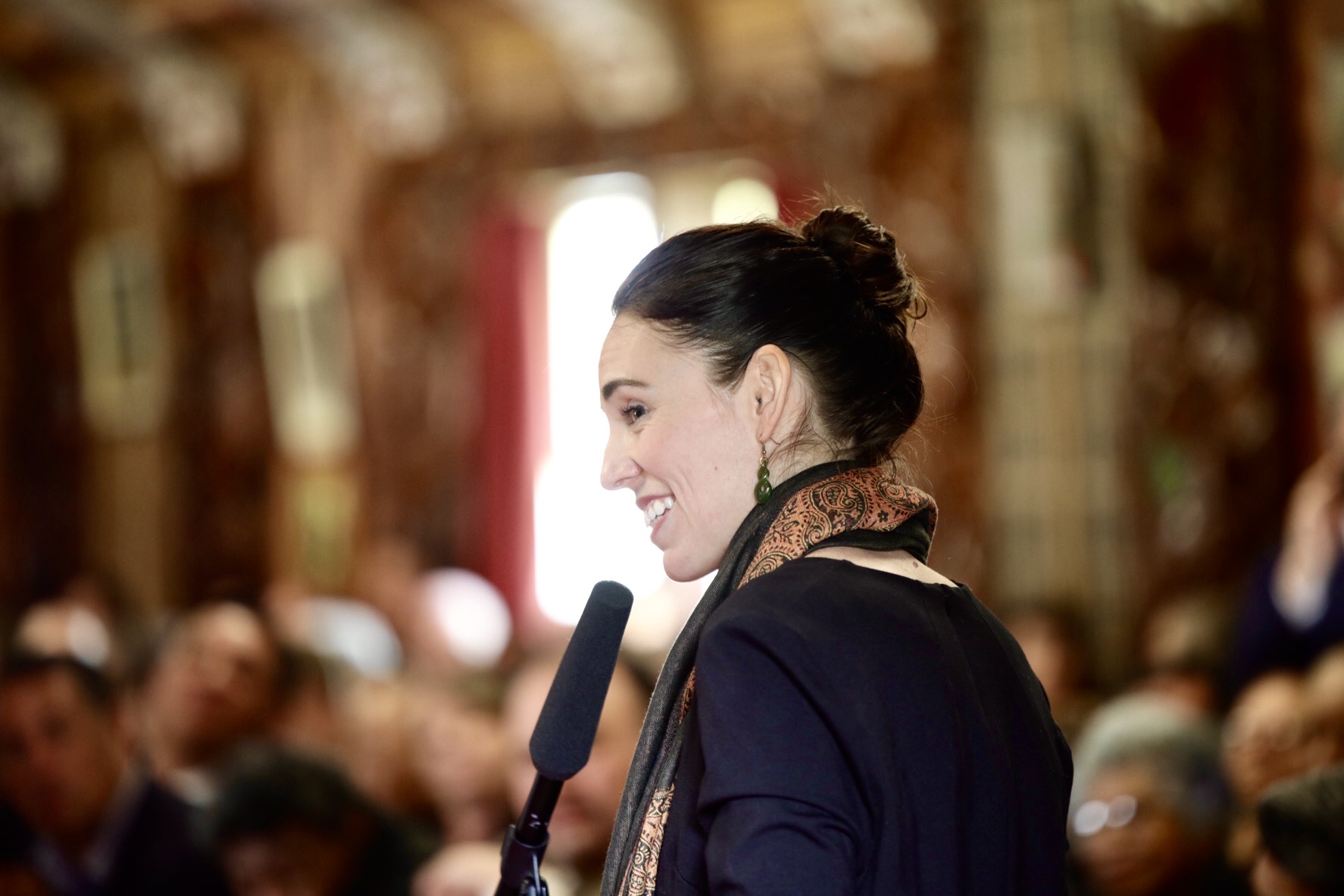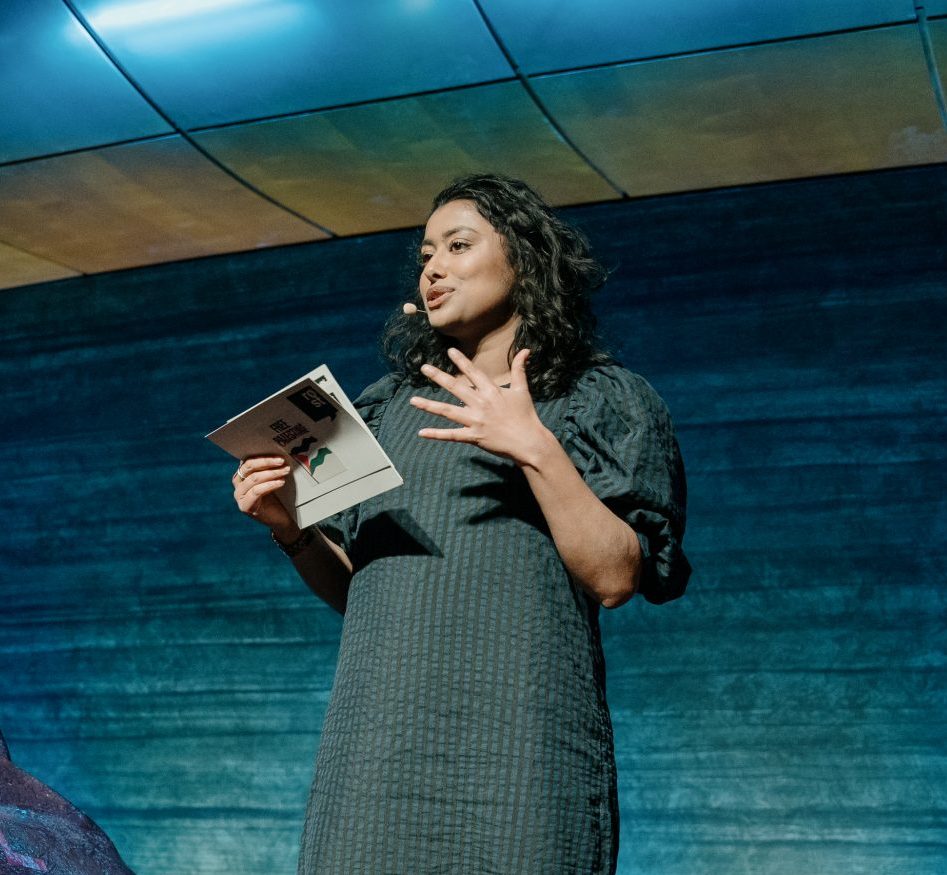
Tale for Christchurch ofrene
Prime Minister Jacinda Ardern
Analyseret af Emma, Ida C, Alice, Danna og Zynab, retorikstuderende ved Københavns Universitet, 2019
“We each hold the power, in our words and in our actions, in our daily acts of kindness”
Den retoriske situation
Denne mindehøjtidelighed bliver afholdt 14 dage efter masseskyderiet d. 15. marts 2019 mod to moskeer i Christchurch i New Zealand. Masseskyderierne – som premiere minister Jacinda Ardern selv kalder et terrorangreb – bliver begået af en enkelt bevæbnet mand under fredagsbønnen i to forskellige moskeer i Christchurch. Masseskyderierne resulterer i 50 dræbte og 48 svært kvæstede.
Hændelsen bliver til at starte med ikke betegnet som terror i medierne – men snarere som et masseskyderi begået af en person med et uheldigt mentalt helbred. New Zealands premierminister, Jacinda Ardern, fordømmer flere gange inden mindehøjtideligheden hændelsen som et terrorangreb i medierne. Hun beskriver det tilmed som et udtryk for had mod den muslimske minoritet i New Zealand. I hendes tidligere interviews og små taler forsøger hun at tage klart afstand til den had og terror, samt understreger at det er de ramte muslimer der tilhører New Zealand og ikke ekstremisterne.
Arderns tale blev holdt under mindeceremonien to uger efter terrorangrebet i Hagley Park i Christchurch. Tjenesten blev ledt i fællesskab af regeringen, Christchurch, lokale iwi Ngāi Tahu og det muslimske samfund. Omkring 20.000 mennesker deltog ceremonien, deriblandt ofrenes familier, de overlevende af angrebet og New Zealændere fra alle hjørner af samfundet – også fra det muslimske fællesskab. Politiske kanoner, så som Australiens premierminister Scott Morrison og andre statsoverhoveder fra Stillehavsområdet, deltog ceremonien. Talen blev sendt live, som blev set til andre mindre mindeceremonier landet over.
Derfor er denne tale interessant:
Det interessante ved denne tale er Arderns forsøg på at konstituere hændelsen som et terrorangreb og at gå imod mediernes tendens til kun adressere islamisk ekstremisme som terrorisme. Hun udviser stort bevidsthed om ordets magt og forener folket netop ved hjælp af ord – i en tid hvor New Zealands brogede befolkning, ellers kunne være splittet.
Arderns mindetale skiller sig ud fra andre mindetaler afholdt efter et terrorangreb. Flere mandlige ministre og præsidenter har i lignende situationer ageret og ytret sig med mere defensive agendaer. De har holdt mindetaler, hvor der er blevet opfordret til mere overvågning og sikkerhed i landet. De har brugt virkemidler, der blandt andet har begrænset civile friheder og ligefrem bekriget terrorisme ved at indtage andre lande – eksempelvis Bushs “war on terror”.
Ardern derimod vælger en mere sympatisk og empatisk tone, hvor nationens velvære og sammenhold bliver sat forrest. Hun framer terrorangrebene som en virus, hvilket peger på, at hun har et tilgivende menneskesyn, der tror på rehabilitering, da virus er noget, som kan kureres. Tonen i talen fremstår altså meget feminin og nærmest moderlig, hvad der på den store politiske scene fremstår en smule utraditionelt, men som dog har en stærk sammenbindende kraft i situationen.
Jacindas tale
https://www.youtube.com/watch?v=YdGq3frFsRo&ab_channel=GuardianNews
E rau rangatira mā, e ngā reo, e ngā mana. Tēnā koutou katoa.
(I acknowledge amongst us today our distinguished leaders, speakers and those who bear authority.)
Ngāi Tahu Whānui, tēnā koutou.
(My greetings to the whole of Ngāi Tahu.)
E papaki tū ana ngā tai o maumahara ki runga o Ōtautahi.
(The tides of remembrance flow over Christchurch today.)
Haere mai tātou me te aroha, me te rangimārie, ki te whānau nei, e ora mārire ai anō rātau, e ora mārire ai anō, tātou katoa.
(So let us gather with love, in peace, for this family , so that they may truly live again, so that we all may truly live again.)
We gather here, 14 days on from our darkest of hours. In the days that have followed the terrorist attack on the 15th of March, we have often found ourselves without words.
What words adequately express the pain and suffering of 50 men, women and children lost, and so many injured? What words capture the anguish of our Muslim community being the target of hatred and violence? What words express the grief of a city that has already known so much pain?
I thought there were none. And then I came here and was met with this simple greeting. As-salaam Alaikum. Peace be upon you.’
They were simple words, repeated by community leaders who witnessed the loss of their friends and loved ones. Simple words, whispered by the injured from their hospital beds. Simple words, spoken by the bereaved and everyone I met who has been affected by this attack.
As-salaam Alaikum. Peace be upon you.
They were words spoken by a community who, in the face of hate and violence, had every right to express anger but instead opened their doors for all of us to grieve with them. And so we say to those who have lost the most, we may not have always had the words.
We may have left flowers, performed the haka, sung songs or simply embraced. But even when we had no words, we still heard yours, and they have left us humbled and they have left us united.
Over the past two weeks we have heard the stories of those impacted by this terrorist attack. They were stories of bravery. They were stories of those who were born here, grew up here, or who had made New Zealand their home. Who had sought refuge, or sought a better life for themselves or their families.
These stories, they now form part of our collective memories. They will remain with us forever. They are us.
But with that memory comes a responsibility. A responsibility to be the place that we wish to be. A place that is diverse, that is welcoming, that is kind and compassionate. Those values represent the very best of us.
But even the ugliest of viruses can exist in places they are not welcome. Racism exists, but it is not welcome here. An assault on the freedom of any one of us who practices their faith or religion, is not welcome here . Violence, and extremism in all its forms, is not welcome here. And over the last two weeks we have shown that, you have shown that, in your actions.
From the thousands at vigils to the 95 year old man who took four buses to attend a rally because he couldn’t sleep from the sadness of seeing the hurt and suffering of others. Our challenge now is to make the very best of us, a daily reality.
Because we are not immune to the viruses of hate, of fear, of other. We never have been. But we can be the nation that discovers the cure.
And so to each of us as we go from here, we have work to do, but do not leave the job of combatting hate to the government alone. We each hold the power, in our words and in our actions, in our daily acts of kindness. Let that be the legacy of the 15th of March. To be the nation we believe ourselves to be.
To the global community who have joined us today, who reached out to embrace New Zealand, and our Muslim community, to all of those who have gathered here today, we say thank you.
And we also ask that the condemnation of violence and terrorism turns now to a collective response. The world has been stuck in a vicious cycle of extremism breeding extremism and it must end.
We cannot confront these issues alone, none of us can. But the answer to them lies in a simple concept that is not bound by domestic borders, that isn’t based on ethnicity, power base or even forms of governance. The answer lies in our humanity.
But for now, we will remember those who have left this place. We will remember the first responders who gave so much of themselves to save others.
We will remember the tears of our nation, and the new resolve we have formed.
And we remember, that ours is a home that does not and cannot claim perfection. But we can strive to be true to the words embedded in our national anthem:
Men of every creed and race,
Gather here before Thy face,
Asking Thee to bless this place
God defend our free land
From dissension, envy, hate
And corruption, guard our state
Make our country good and great
God defend New Zealand
Ko tātou tātou
(we are one)
As-salaam Alaikum
(Peace be upon you)
Det siger retorikerne:
Det desuden værd at bemærke Arderns valg af tøj. Hun bærer en korowai, en traditionel Maori-kåbe båret af dem med højest prestige til særlige lejligheder. På den måde understreger hun situationens vigtighed og hendes forhold til den New Zealandske befolkning. Vigtigere fremhæver hun hele formålet med talen; at huske befolkningen på dets fundamentale værdi – vi skal leve sammen i harmoni som en stor familie.
